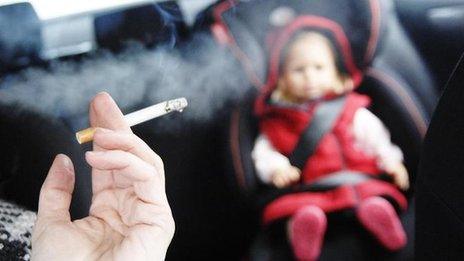Smoking parents 'pollute children'
- Published

Two of the children examined were exposed to pollution 50 times greater than peak time traffic in Edinburgh city centre, Ash Scotland said
Young children of smokers are being exposed to high levels of nicotine intake and air pollution comparable with major industrial smog, according to a study by an anti-smoking charity.
Ash Scotland tested children aged one to five from 54 smoking households in Aberdeenshire for nicotine exposure.
All but one had very high levels of nicotine in their saliva.
Exposure was higher in younger children due to the increased time they spend closer to their mothers.
Two children aged three and five were exposed to pollution 50 times greater than peak time traffic in Edinburgh city centre, and about 20 times greater than recommended safe levels.
One 32-year-old mother-of-two smoked in every room apart from the children's bedrooms, and also in the car, despite one of her children suffering from asthma.
Researchers found air pollution nearly 20 times greater than the World Health Organisation's recommended limit in her flat.
Ash Scotland said the woman subsequently stopped smoking in the car, cut down on her cigarettes and confined herself and her smoking guests to the kitchen, leading to a reduction in pollution levels.
A 23-year-old single mother, who works in a hospital, thought she was protecting her five-year-old child by confining her smoking to the kitchen, but researchers found pollution levels even higher than those in the 32-year-old's flat.
She said: "I didn't realise how much damage it actually will cause if I keep smoking in the house. It's quite scary.
"If I think about the bad things that could happen, like all the lung problem and stuff that I could bring to my son through my smoking, it's not worth it."
'Smoking outside'
Dr Sean Semple, of the University of Aberdeen, who analysed the results, said: "When smoking takes place at home, the indoor air pollution levels are comparable with those measured during major industrial smog events in cities like Beijing and Singapore.
"Over 85% of the fine particles and hazardous chemicals in second-hand smoke are invisible and these measurements show that levels of harmful particles can reach very high peaks and that the smoke lingers in the air for long after the cigarette is extinguished."
Sheila Duffy, chief executive of Ash Scotland, said: "Around 100,000 children in Scotland are affected by tobacco smoke in the home, with all the health problems that brings.
"We know that smoking parents want to protect their children. What we can do is help them to understand how much smoke travels around the home and how long it lingers in the air.
"That is why we encourage them to do their smoking outside, and make their home and car entirely smoke-free."
The smokers' group Forest said most parents who smoke had already chosen to alter their behaviour and "very few adults light up around young children in small enclosed spaces".
Director Simon Clark added: "We would support a public information campaign on the issue as long as it is based on fact not scaremongering, but any attempt to ban smoking in cars or the home will be strongly opposed.
"Home and cars are private spaces and legislation would be very difficult to enforce without evidence from neighbours, friends and other family members.
"That would be a step too far in our opinion."
- Published19 November 2013
- Published22 July 2013
- Published6 March 2012